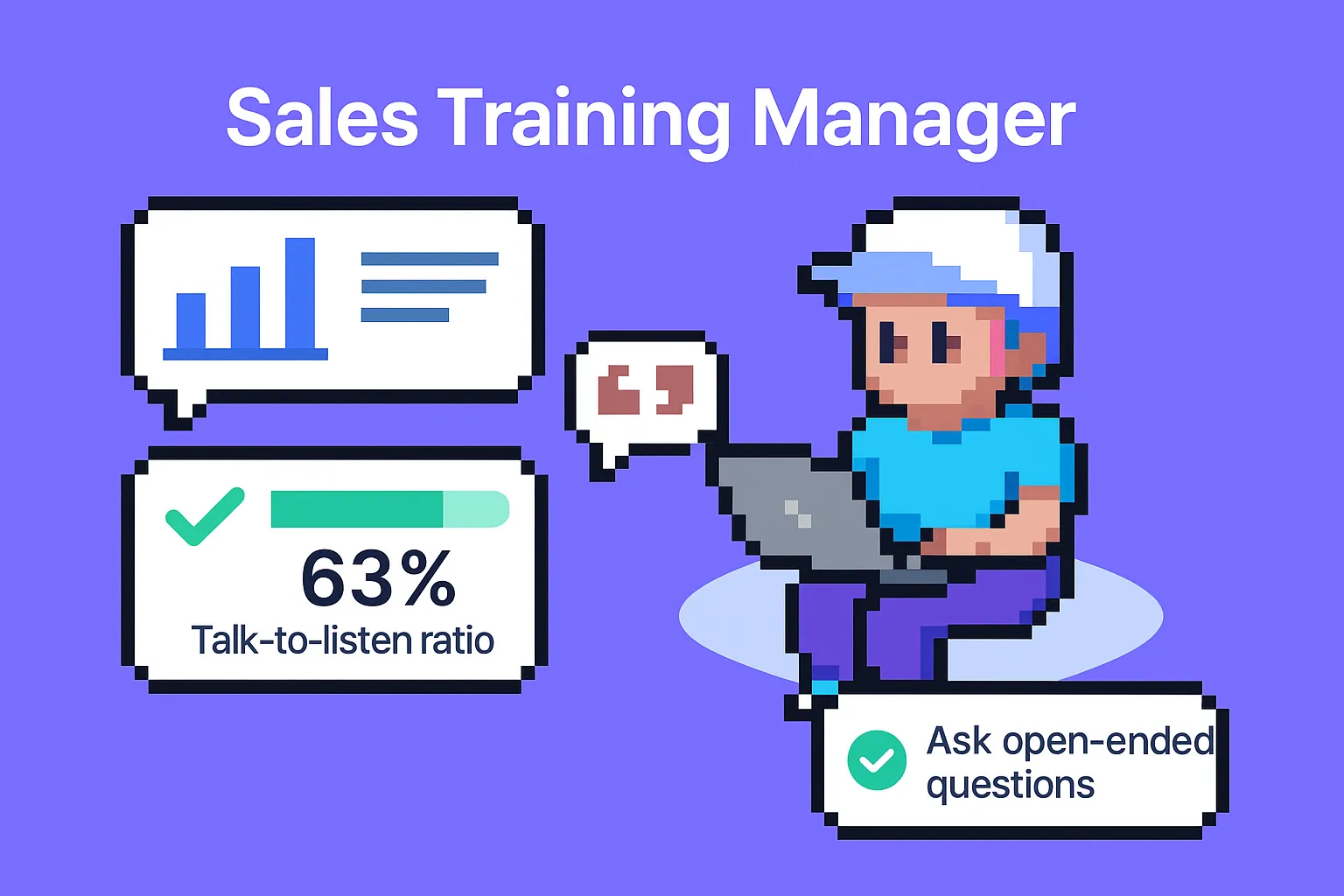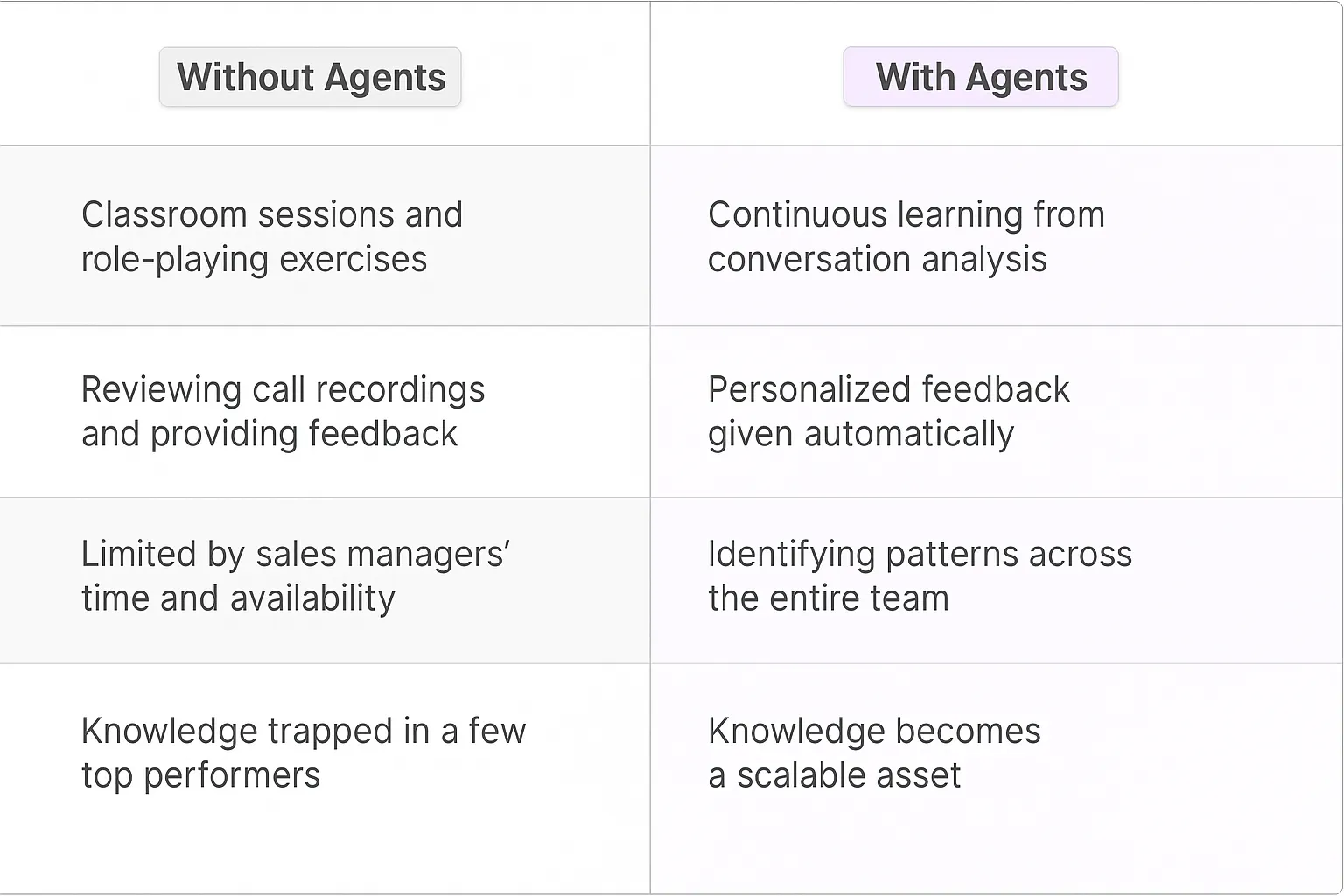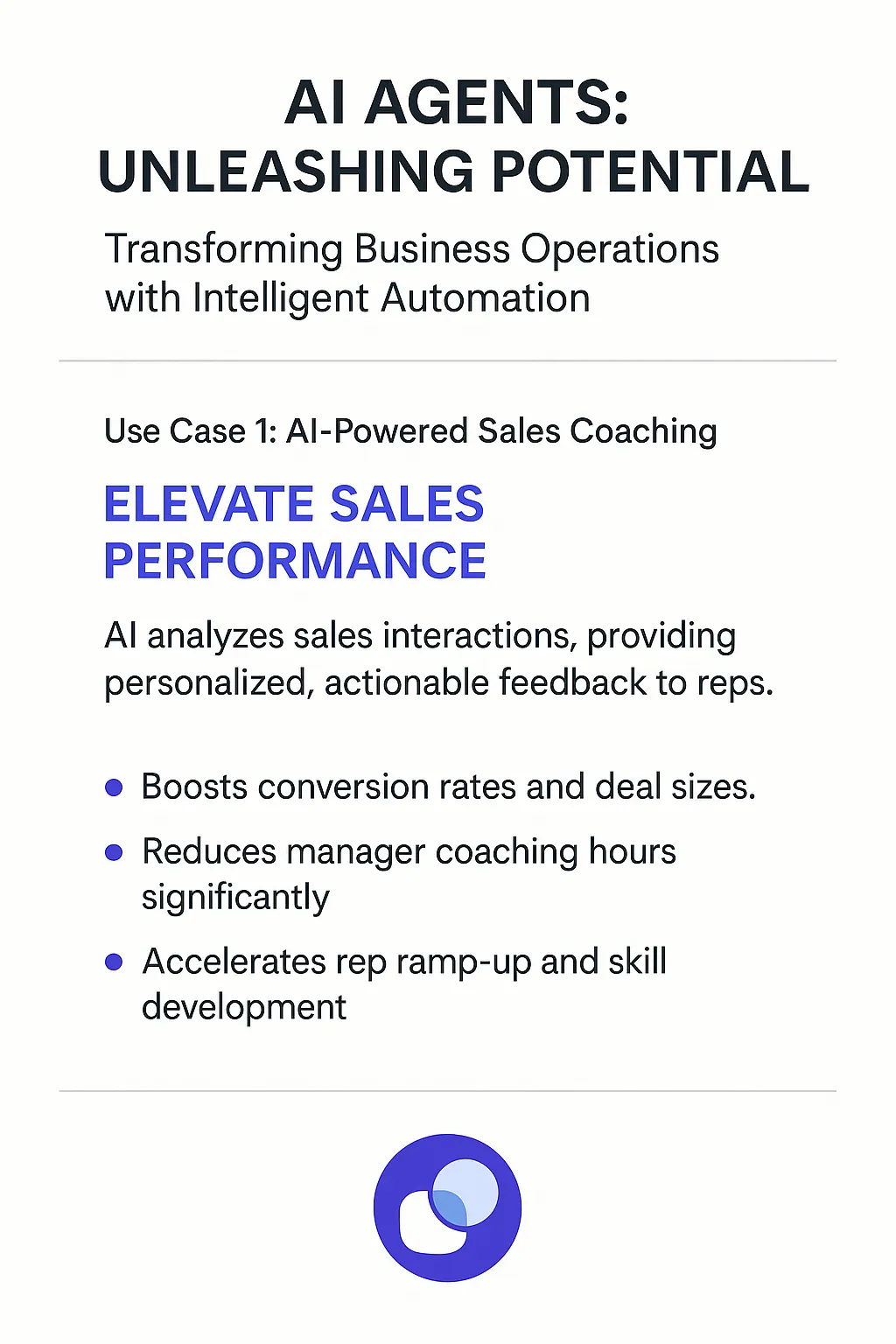Sales Training Manager is an AI-powered system that functions as a digital teammate for sales organizations. It combines advanced conversation analysis, personalized coaching, and pattern recognition to transform how teams develop and scale their sales expertise. Unlike traditional training methods, it creates a continuous learning environment where every interaction contributes to the collective knowledge of the sales organization.

Traditional sales training relied heavily on a mix of classroom sessions, role-playing exercises, and shadowing experienced reps. Sales managers spent countless hours reviewing call recordings, providing feedback, and trying to scale their expertise across growing teams. The process was inherently limited by human bandwidth - even the most dedicated sales leaders could only be in one place at a time.
Companies typically used a combination of:
The introduction of AI Agents into sales training creates a fundamental shift in how teams develop and scale their sales expertise. These digital teammates function as always-on coaches that can analyze thousands of conversations simultaneously while providing personalized feedback.
Key benefits include:
The most compelling aspect is how AI Agents transform the economics of sales training. Instead of knowledge being trapped in the heads of a few star performers, it becomes a scalable asset that grows smarter with each interaction. This creates a continuous improvement loop where the entire sales organization benefits from collective learning.

When we look at the most effective sales organizations, we're seeing a fundamental shift in how they approach training. The traditional model of periodic training sessions and static playbooks is being replaced by AI-driven continuous learning systems that create powerful network effects.
The magic happens in the feedback loop: every customer interaction becomes training data, every successful close contributes to the collective knowledge base, and every new insight gets immediately distributed across the team. This creates what I call the "Sales Intelligence Flywheel" - where each turn makes your entire sales organization smarter and more effective.
What's particularly fascinating is how this transforms the role of sales managers. Instead of relying on gut feelings or quarterly reviews, they're now operating with real-time, data-driven insights. They can spot patterns across hundreds of sales conversations and replicate winning strategies across their entire team within hours, not months.
The most successful implementations I've seen treat their AI sales trainer as a digital teammate that's always learning, always analyzing, and always ready to provide contextual guidance. This isn't just about automation - it's about amplification of human capabilities in sales.

Sales training AI agents are transforming how companies develop and empower their sales teams. Drawing from my experience scaling growth teams, I've observed how these digital teammates create compound learning effects across organizations. The versatility of AI agents in sales training makes them valuable across various industries, each with unique selling motions and customer engagement patterns.
What's particularly fascinating is how these AI agents adapt their training approaches based on industry context - from complex enterprise software deals to high-volume retail transactions. They're not just static training tools; they're dynamic learning partners that evolve with your sales organization's needs.
The real power comes from their ability to simultaneously handle multiple training scenarios while maintaining consistency in core sales methodologies. This creates a force multiplier effect that traditional sales training programs simply can't match. Let's examine how different sectors are leveraging these capabilities to build stronger, more capable sales teams.
The real estate industry faces a unique challenge - training thousands of agents across distributed offices while maintaining consistent messaging and sales techniques. A Sales Training Manager AI Agent transforms this traditionally fragmented process into a scalable, personalized experience.
Large brokerages like Compass and eXp Realty can deploy these digital teammates to run realistic role-play scenarios with agents, simulating everything from first-time buyer consultations to luxury property negotiations. The AI analyzes each interaction, picking up on subtle cues like word choice, objection handling, and closing techniques.
What makes this particularly powerful is the compound learning effect. When an agent in Miami discovers an effective way to handle pricing objections, the AI incorporates that insight into its training repository. Now agents in Seattle and Boston can benefit from that knowledge, creating a network effect for sales expertise.
The metrics tell an interesting story: Brokerages using AI-powered sales training report 32% faster ramp-up times for new agents and a 47% improvement in conversion rates for agents who regularly practice with the AI. But the real magic happens in the micro-moments - like when an agent receives instant feedback on their tone during a tough negotiation scenario, or when the AI spots patterns in successful closing techniques across thousands of practice sessions.
This isn't just about replacing traditional training methods - it's about creating an always-on training environment where agents can practice specific scenarios on demand, get immediate feedback, and continuously refine their approach based on data-driven insights from across the entire organization.
The pharmaceutical industry's sales training has always been a complex dance of medical knowledge, regulatory compliance, and relationship building. What's fascinating is how Sales Training Manager AI Agents are transforming this traditionally rigid space into something far more dynamic and effective.
Take Merck's approach - they've integrated AI-driven training that simulates conversations with different physician personas, from skeptical neurologists to time-pressed primary care doctors. The AI creates thousands of unique scenarios, incorporating real-world objections about drug efficacy, insurance coverage, and competing treatments.
The most interesting pattern I've observed is the network effect in knowledge sharing. When a sales rep in Boston discovers an effective way to explain a new drug's mechanism of action to oncologists, the AI captures and distributes that insight across the entire sales force. This creates a fascinating flywheel effect - each interaction makes the entire system smarter.
The data tells a compelling story: Pharmaceutical companies using AI training report that reps reach competency 40% faster, and their detail discussions with physicians last 23% longer. But the real breakthrough is in compliance adherence - AI-trained reps show 98% accuracy in staying within FDA guidelines during simulated pitches.
What's particularly clever about this application is how it handles the industry's rapid changes. When new clinical data emerges or regulatory guidelines shift, the AI immediately incorporates these updates into training scenarios. This means sales reps can practice handling questions about breaking research or updated safety protocols before they ever step into a doctor's office.
The growth loops here are fascinating - more rep interactions lead to better training data, which creates more effective sales conversations, driving higher physician engagement and ultimately better patient outcomes. This isn't just moving training online; it's creating an entirely new learning ecosystem that gets smarter with every interaction.
Building an effective sales training AI requires deep integration with existing CRM systems and sales tools. The AI needs clean, structured data about past sales interactions, call recordings, and deal outcomes to learn effectively. Many organizations struggle with fragmented or inconsistent data across different platforms, making it harder for the AI to extract meaningful patterns. The AI also needs to handle various accents, industry terminology, and communication styles without breaking.
Sales training content varies significantly across industries, products, and target markets. The AI needs extensive domain expertise to provide relevant coaching. Building this knowledge foundation takes significant upfront investment - from documenting best practices to encoding complex sales methodologies. The knowledge base must also stay current as products and market conditions evolve.
Sales teams often resist new tools that feel like "big brother" watching them. The AI needs to position itself as a supportive coach rather than a critical overseer. Some reps worry the AI will expose their weaknesses or be used to evaluate their performance. Clear communication about how the AI supports skill development rather than surveillance is crucial.
Sales cycles can span months, making it challenging to connect training interventions to outcomes. The AI needs sophisticated attribution models to understand which coaching recommendations actually drive results. It must also account for external factors like market conditions and competitor moves that influence deal success beyond rep performance.
Every sales organization has unique processes, terminology, and cultural nuances. A one-size-fits-all AI training approach often falls flat. The system needs extensive customization capabilities while maintaining core functionality. This balance between standardization and flexibility creates development complexity.
Successfully implementing AI sales training requires shifts in behavior and mindset across the organization. Sales managers need to adapt their coaching style to complement the AI. Leadership must commit resources to ongoing optimization and maintenance. Without proper change management, even technically sound implementations can fail to deliver value.
The shift to AI-powered sales training represents a fundamental evolution in how organizations develop sales talent. The network effects created by these digital teammates - where every interaction makes the entire system smarter - are creating unprecedented scaling opportunities. The most successful organizations aren't just using AI to automate training; they're leveraging it to build learning loops that continuously improve their entire sales operation.
What's particularly exciting is how this transforms the economics of sales expertise. Instead of knowledge being trapped in individual relationships or static documents, it becomes a dynamic, growing asset that benefits the entire organization. The companies that master this transition will have a significant competitive advantage in their ability to rapidly develop and scale high-performing sales teams.